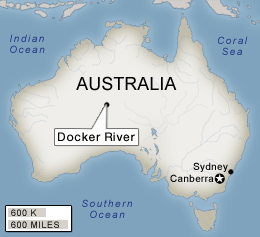Meeting Shy Aboriginals In Australia's Outback
In "Everybody Has a Story," every two weeks someone threw a dart at a map of America. CBS News correspondent Steve Hartman then went wherever it stuck, flipped through the local phone book, and picked a name at random. He then did a story on someone at that house. With the help of space-age technology, Hartman goes global as he continues - "Everybody in the World has a Story."
Day 8: DOCKER RIVER, Australia
After three hours down a dirt road, we arrived in the Aboriginal community of Docker River.
Normally, my next step in the process would be to randomly select someone from the phonebook. But that's not going to work here.
First of all, there's no phonebook. Secondly, the people here are beyond camera shy. As a community, they don't normally even converse with outsiders -- let alone an outsider with a camera and a crazy story about a spaceship and an inflatable globe.
Some of the locals speak a little English, but most just speak their native language. My first order of business will be finding an interpreter.
Secondly, we'll try to see who, if anyone might consent to an interview. If we find more than one willing participant, we'll put their names in a hat and draw a "winner".
Although 300 people live here, I'll be surprised if we get more than 5 takers. I'll also be surprised if we hear any sort of heartwarming tale.
Read Steve Hartman's Travel Blogs:
Halfway Around the World in Four Days
Looking for a Story in Cordoba, Argentina
Everybody in the World Has a Story, Round 2
Although I'm always on the lookout for positive stories, those seem few and far between in Docker River. Like Aboriginal communities across Australia, residents here have more problems than the government has solutions. Despite substantial government handouts, the Aboriginals live in squalor. They have no job skills and, even if they did, there are no jobs. Alcoholism is a problem. Kids sniff gas to get high. At one point the sniffing became such a serious issue that the government mandated that you could only use a special kind of gasoline while driving on Aboriginal lands -- a special gasoline that can't be "sniffed".
As a group, the Aboriginal people have not assimilated very well into the western society. It's almost understandable considering how quickly they've had to adjust.
The adults of the community are just 2 generations removed from their hunter, gatherer ancestors.
Just about anyone in their 70's can remember their first contact with white men. Often those Aboriginal elders thought they were seeing ghosts and ran into the bush. In my limited time here I've already heard several stories like that.
Perhaps the story I end up telling will be about the struggle to change. Perhaps it'll be about the converse -- the struggle to stay the same and hold onto 50,000 years of culture and tradition.
Or maybe it'll be something completely unexpected. We'll find out tomorrow.
Check back with Couric and Co. for Steve's travel blogs. The rest of Steve's stories are on his "Assignment America" page.

